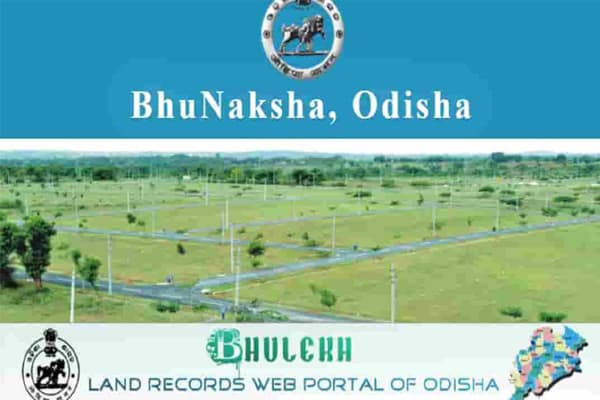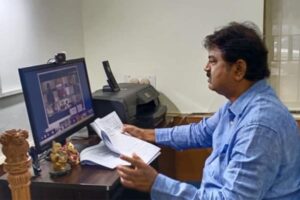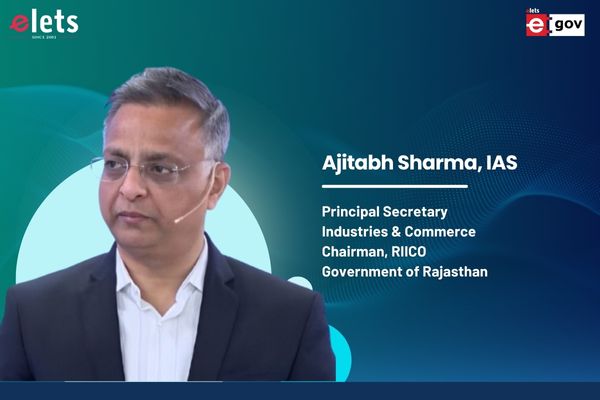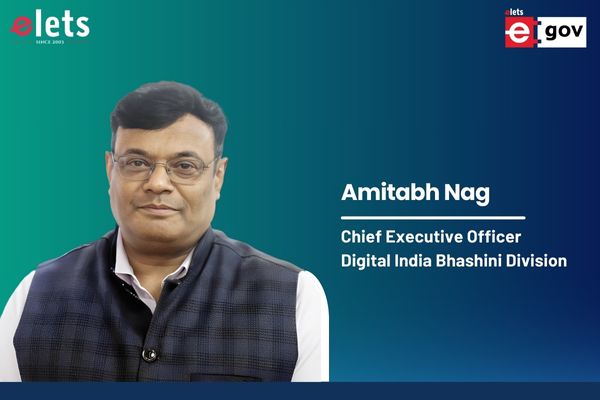
Owing to the COVID-19 pandemic, the governments, industries and even the common people have taken the digital route to continue their activities. The pandemic has opened eyes to realise the value of digitisation and technology. Sharing his perspective on how digitisation in Odisha augmented revenue and land services, citizen services, and other government sectors, CJ Venugopal, IAS, Member, Board of Revenue, Odisha, interacted with Kartik Sharma of Elets News Network (ENN) in an exclusive interview.
Please give us a brief idea on IT innovations done in the Land and Revenue sector in Odisha?

We have taken a number of IT interventions in the land and revenue sector for the benefit of the citizens. Revenue and Disaster Management Department of Odisha had brought a great change in the revenue administration of the state by the introduction of ‘Bhulekh’ web service. Bhulekh is a part of the Land Records Modernisation Initiative implemented by the government and under this programme, the government aimed to achieve complete digitisation of all the land records. Odisha successfully made all the land records digital and accessible to the general public through Bhulekh Odisha website.

Similarly, the introduction of the CCMS (Court Case Monitoring System) project was a revolutionary step that brought the general public and the Revenue Administration closer. The general public can now get to know about the status of land through Bhulekh and about the status of Revisional Cases through CCMS project. Through ‘Bhunaksha’ software, the general public can view and search tehsil and village wise maps of the state. The other IT innovations introduced in the revenue sector are online issuance of miscellaneous certificates, online mutations of Tehsil wise RoRs and payment of revenue dues online.

Please tell us about the IT interventions in ease of registration of land in Odisha?

To make the registration of a property hassle-free, we have reengineered the whole registration process in Odisha and now it can be done with ease, through the Inspector General of Registration Revenue and Disaster Management Department (IGR) website. The department is primarily responsible for computerisation of revenue offices, updating of land records, digitisation of cadastral maps, inter-connectivity among revenue offices, undertaking survey operations using modern technologies, etc.
- To offer ease of registration, the department makes available a host of services on its website. These include:
- Online land records, showing the ownership of the land
- Model sale deed format for property registration in Odia and English languages
- Issuance of e-Stamp certificates
- Online payment of registration fees
- Stamp duty and registration fees calculator
- Benchmark valuation of all land
Several online facilities have been provided to the citizens for registration. Various certificates required for different purposes are now made available online easing the requirements of the citizens.
Please tell us about the opportunities and challenges of Virtual Court hearings in the lockdown period and what have been the innovations to overcome the challenges?
Last year during the lockdown period pertaining to COVID-19 pandemic, there had been certain restrictions on the movement of people imposed by the Government, we felt that was opportune time for introduction of Virtual Courts by the Revisional Courts under Board of Revenue, Odisha.
By holding Revisional Courts through the Virtual Courts system integrated with CCMS project the concept of social distancing was being adhered to in letter and spirit as the people need not visit the Revisional Courts physically to contest their cases. This is now being used as an alternative to in-person interactions between petitioner, defendants, and all parties related to trials and judgment. The general public/their advocates could participate in the Court proceedings by sitting at the comforts of their home or workplace through online linking to the concerned Courts via links provided to them in the Daily/ Weekly Cause lists of the Courts.
Virtual court concept is not just for ease of use. The fact of the matter is that most court systems are already dealing with the burden of heavy backlogs of cases and other matters. Anything that can be used to speed things up is a boon for this sector of the government. However, there are certain challenges that also come along with this opportunity. The challenges faced in holding of Virtual Courts during the lockdown period are providing online platform to all the litigants to participate in the hearing of their revisional cases, since many litigants are either not techno-savvy or that they have not provided their email IDs/mobile numbers it was difficult to facilitate the process. Besides, the sustainability of the data in the virtual cloud space for a longer and trouble free environment for usage by more number of participants during a single sitting of virtual court also poses a challenge.
To overcome such challenges steps were being taken in consultation with the National Informatics Centre (NIC) to broaden the virtual data cloud space, the speed of data and other technical issues. The information gap of email IDs/mobile numbers have been addressed by collection of proper data from the users for holding the virtual courts. Also, regular training is being imparted to the departmental personnel in the revisional courts for smooth facilitation. The Virtual Court platform for government work is device agnostic i.e., it can be operated on Desktop, Laptop, IPad, Smartphone, etc. The result is a virtual court system that deals with more hearings per day in a quicker and more efficient manner. Aggrieved citizens can get on with their lives faster and pursue the next course of action or other solutions for their future in a time bound manner.
I sincerely hope that virtual courts have the capacity to break through the barriers of months-long waiting periods and speed up the court work at the same adhering to public safety of social distancing.
Also Read: – Technological interventions reshaping governance
Please share insights on the innovative Court Case Management System which you have developed in Odisha?
The introduction and development of the innovative CCMS application in the State of Odisha has transformed the old practice of physical verification of Court case status by the general public. It not only saves time but is also a cost-saving option for people.
Revenue Court Case Monitoring System is a generic e-governance system yet unique of its kind. It can be rolled out across the country with minimal customisation or modification. SMS integration and online Stamp and Payment Gateway modules are planned for implementation shortly. The mutation cases along with Appeal cases are handled in Revenue Court Case Monitoring System. The database contains all the Revenue case details. The processing stages and the final disposal status are made available online to the concerned people.

Please tell us more about the document management system?
As the revenue documents are of vital importance for Revenue Administration, they need to be preserved for future use. The physical records after they have been finalised are generally preserved in Record Rooms of various offices. However with the advancements in the technologies the documents of various offices can now be stored in Digital formats. Our Document Management System (DMS) is a digitally storage and retrieval system introduced for online storage and retrieval of the records, indexing of data and images, etc. The land record details, case records, maps and other documents are scanned/digitised, indexed and stored in computer systems which can be used at any given point of time.
The objectives of the DMS are to preserve the data of tehsil case records in scanned copy format, meta data storage of records for intelligent search facilities, easy retrieval of soft and hard copies of the Tehsil records and maintenance of flow of case records for court cases. As a result, the flow of the document to courts and their movement is being recorded in the system and we can easily provide certified copy to the citizens.


Please tell us about the successful integration of databases to ensure better services to the citizens?
Presently, the databases of various online programmes are at their introductory stage in the state which are continuously being developed to cater the needs of the people and revenue administration. For better administration, we need to keep pace with the technological advancements, which can be done through successful integration of the databases with various developmental programmes. By giving importance to the end user’s needs and priorities for rendering better services to the citizens at large we can take up need based integration for optimal results. This will also enable faster decision making and to make available information/certificates/land records to the concerned citizens.
You have taken e-governance initiatives in every department you work. What has been the inspiration?
We are in the most exciting phase of e-governance in the history of our country. Information Technology (IT) is bringing a great transformation in the governance spectrum. Though we still have a long way to go, compared to some developed countries. Our lack of physical infrastructure, awareness and digital literacy are some of the hurdles that we are yet to overcome. But as time progresses, I think we will be able to find ways and means to overcome these challenges. Over the years, I have used my project management techniques and expertise to conceptualise innovative e-governance solutions which had helped departments to identify and clear bottlenecks, promoted transparency, reduced service delivery costs, and delivered public services efficiently.
As of now, the priority of the R&DM Department is to be on a digital platform for each and every component. This approach eventually will lead to leveraging the power of IT for streamlining of administrative functions, reduce duplication of work and increase transparency. In addition, the processes of data collection and analysis will be simplified, and become less tedious. E-governance holds advantages to citizens in every walk of their life. But perhaps the single-largest benefit of e-governance is it’s potential to make the state and nation an information and knowledge society and contrary to popular perception, its impact will be far-reaching, down to the villages and could bridge traditional and digital divides across the country.
Also Read: – Chhattisgarh: Endeavouring for Giant Leap in Education Paradigm
Be a part of Elets Collaborative Initiatives. Join Us for Upcoming Events and explore business opportunities. Like us on Facebook , connect with us on LinkedIn and follow us on Twitter, Instagram.
"Exciting news! Elets technomedia is now on WhatsApp Channels Subscribe today by clicking the link and stay updated with the latest insights!" Click here!













